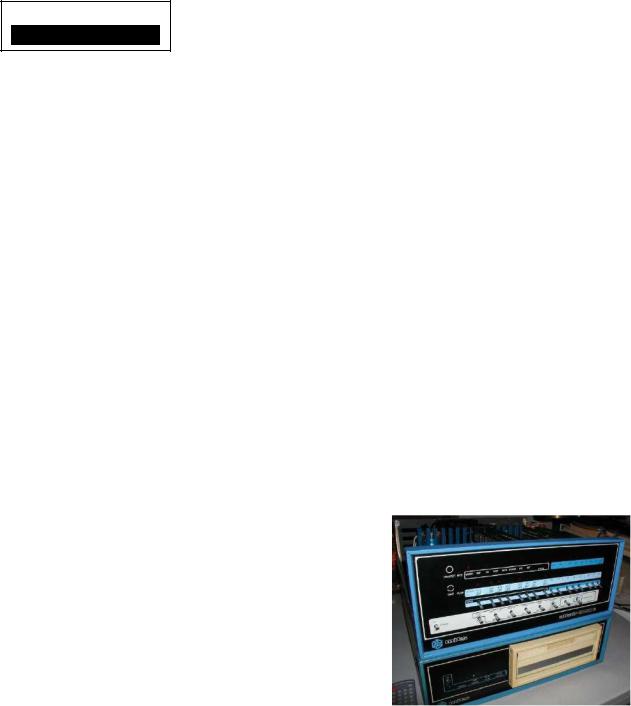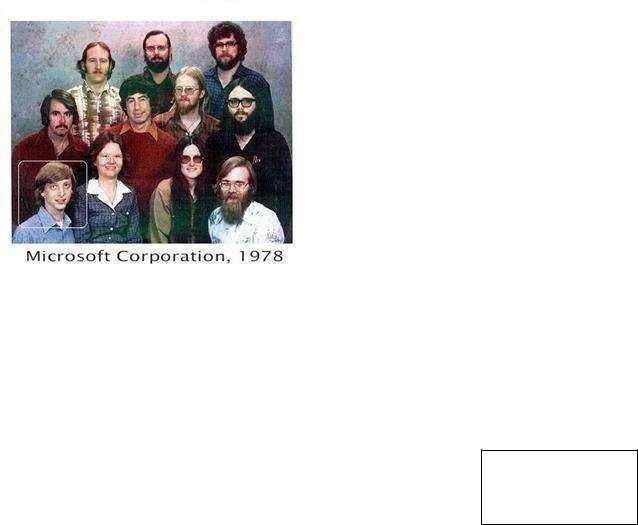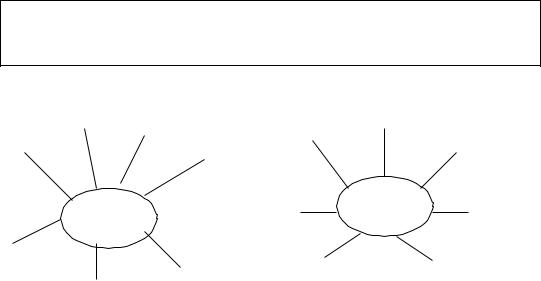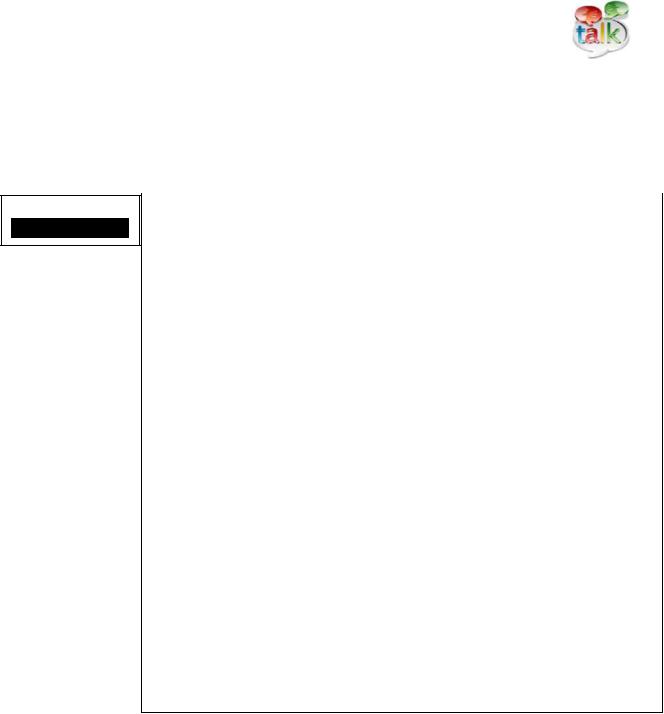
8452
.pdf
Activity 1
Computer Revolution
The idea of information age is usually linked to the concept
of a Digital Age, Digital Revolution or Computer
Revolution.
1. You are going to read the article by Bill Gates, the Chairman and Chief Software Architect of Microsoft Corporation, about the beginning of computer revolution. Before reading decide whether you think these statements are true
(T)or false (F).
1.Bill Gates created the first desk-top computer Altair 8800.
2.BASIC programming language was rather simple, so everyone could use it.
3.At first Microsoft software was not very popular among programmers.
4.Today we completely rely on computers to run our lives and businesses.
5.We have fully exploited the PC’s potential.
2. Read the article and check your answers.
For me the personal computer revolution started in the mid-1970s, when my friend Paul Allen and I saw a magazine article about the MITS Altair 8800. The Altair was the first build-it- yourself computer kit for hobbyists. For a few hundred dollars, MITS would mail you a few bags of parts and some photocopied instructions. After
some careful soldering*, you had your own computer, about the size of a bread box, with rows of switches and blinking lights.
It wasn't much to look at and it wasn't terribly useful, but it felt like the start of a revolution. Until then computers were used mostly by technicians in air-conditioned rooms. Few people had the opportunity even to see a computer and even fewer got to use one. But the Altair was a computer that people could put on their desks, and what

they could do with it was limited only by their imagination — and the modest capabilities of Intel's 8080 microprocessor.
We knew that microprocessors would become cheaper and more powerful, making personal computers increasingly capable. We also knew those computers would need software to make them do useful things. So Paul and I founded a company we called Microsoft that we hoped would meet this need.
Our first product was a version of the BASIC programming language that could run on the Altair. Unlike many other languages available at the time, BASIC was relatively simple to use. After a few minutes of instruction, even a nontechnical person could start writing simple programs.
For its time the Altair was a huge success, and thousands of programmers
used our software to make it do interesting and useful things. Since then the PC has evolved from a hobbyist's toy into a powerful tool that has transformed how we work, learn, play, and keep in touch. And it has created an industry that employs millions of people and plays a leading role in our global economy.
Computing has made many evolutionary leaps over the decades - from the command line to the graphical user interface, from stand-alone PCs to a globally connected
Help Box
decade is a period of ten years
Internet. But we're now seeing an even more fundamental change. We're in what I call the "digital decade," a time when computers are moving beyond being merely useful to becoming an essential part of our everyday lives. Today we use computers for discrete tasks—like doing e-mail and paying bills — but in the years ahead they'll play a key role in almost everything we do. We'll rely on them to run our lives and businesses. We'll want them to keep us informed and entertained. We'll expect them to be wherever we need them. It will be an era of truly personal computing.

Many of our early dreams for the PC have already come true. They can recognize speech and handwriting, create realistic animation, and enable people to collaborate, communicate, and find information around the world. But we've barely scratched the surface** of the PC's potential, and I'm incredibly excited about the amazing innovations that are just over the horizon.
*soldering - joining two pieces of metal together by melting a small piece of softmetal
**scratch the surface - to deal with only a very small part of a subject or problem
(Adapted from http://www.greatachievements.org/)
Activity 2
Vocabulary Focus
1. Match the words to form expressions from the
text and translate the expressions into Russian:
evolutionary |
change |
discrete |
tool |
global |
leaps |
fundamental |
economy |
essential |
success |
modest |
capabilities |
powerful |
tasks |
huge |
part |
|
|

2. a. Match the following words/expressions in English with their Russian
equivalents:
meet the needs |
распознавать речь и почерк |
run our lives and businesses |
оплачивать счета информи- |
play a leading role/a key role |
ровать и развлекать |
pay bills |
управлять нашей жизнью и делами |
keep us informed and entertained |
удовлетворять потребности под- |
recognize speech and handwriting |
держивать связь |
keep in touch |
играть главную роль |
|
|
b.Make up your own sentences using these expressions.
3.a. Fill in the diagrams with the following words from the box:
an effort, homework, money, your best, a mistake, progress, research, a noise, someone a favour, a phone call, nothing, a decision, business
do
make
b. Find examples of the phrases with do and make in the text above.

c. Complete the questions below with make or do in the correct form:
1. |
Are you generally good or bad at |
|
|
decisions? Does it depend on the |
||||||||||
|
kind of decision? |
|
|
|
|
|
|
|
|
|
|
|
|
|
2. |
In which areas do you think you are |
|
|
|
|
most progress in your |
||||||||
|
studies? |
|
|
|
|
|
|
|
|
|
|
|
|
|
3. |
When was the last time you |
|
someone a favour? What was it? |
|||||||||||
|
|
|
|
|
|
|
|
|
|
|
|
|||
4. |
How do you feel when you find out you |
|
|
|
|
|
mistakes in your last test? |
|||||||
5. |
Have you ever |
|
research? In what subject? |
|||||||||||
6. |
When you have holidays do you enjoy |
|
|
|
|
nothing or do you like to be |
||||||||
|
active? |
|
|
|
|
|
|
|
|
|
|
|
|
|
7. |
How do you feel when your neighbours |
|
|
|
|
|
noise? What do you |
|||||||
|
usually do? |
|
|
|
|
|
|
|
|
|
|
|
|
|
d. Ask and answer the questions.
Activity 3
Pronunciation
Put the words from the boxes in the correct columnsaccording to the pronunciation of the letters in bold:
Technology, personal, electric, clearly, completely, rely, widespread, terribly, technician, even, modest, microprocessor, key, cheaper, increasing, need, version, success, evolve, learn, employ, leading, economy, leap, decade, fundamental, beyond, merely, essential, discrete, ahead, entertain, expect, era, early, dream, recognize, speech, realistic, enable, people, incredibly, excited, period, research, service, exploit.
as in pen |
as in clean |
as in exam |
as in term |
as in here |
|
|
|
|
|
|
|
|
|
|

|
Extension |
|
Discuss the following questions: |
|
|
|
|
1.What was your first computer like? What tasks did you use it for?
2.What role do computers play in your life now?
3.How will computers change in the future? What functions will they perform?
Activity 4 Grammar review
Present Perfect
We use the present perfect to:
talk about actions that continue from the past to the present.
He has worked as an engineer for more than 20 years.
(= He is still an engineer.)
talk about past events that have a result in the present.
The role of women has changed over the past 100 years.
talk about life experiences.
He has been to many countries on business.
The following time expressions are used with the present perfect: since, ever,never, yet, just, already, for, so far, recently.
Present Perfect and Past Simple
1.We use the past simple for completed actions that happen in the past. Because the time reference is past, we use time expressions that refer
tofinished past time.
John passed his driving test last week.
Fifty years ago people didn’t have personal computers. Bill Gates and Paul Allen founded Microsoft in 1975.
2.The decision to use the past simple or present perfect depends on how wesee the event. If we see it as related to the present, we use the present perfect. If we see it as completed in the past, we use the past sim-
ple.
I’ve known Mary for many years.
(= We are still in touch.)
I knew Mary when I was at college.
(= We don’t keep in touch.)
(See page 112)
1.Find examples of the past simple and present perfect in the text above.
2.Choose the right answer.
1. When |
|
the company? |
a)have you joined
b)did you joined
c)did you join
d)have you ever joined

2. |
|
in Germany? |
a)Did you ever worked
b)Have you ever worked
c)Worked you
d)Didn't you have worked
3.That's the best presentation
a)I never heard
b)I didn't hear
c)I heard
d)I've ever heard
4.He's the most creative person
a)I never met.
b)I never meet.
c)I've ever met.
d)I've never met.
5. |
|
to him last week. |
a)I spoke
b)I've already spoken
c)I didn't spoke
d)I speaked
6. The reason I look so brown is that |
|
from a business trip to |
Spain.
a)I come back
b)I came back
c)I never came back
d)I've just come back
7. It's obvious that |
|
your homework. |
a)you haven't done
b)you didn't do
c)you don't do
d)you do not

MODULE 3
CIVIL ENGINNERING – A “CHALLENGING” PROFESSION?
Lead in |
“The profession of Civil Engineering is the art of directing the |
|
|
|
great sources of the power of Nature for the use and convenience |
|
|
|
of Man.” (from Wikipedia) |
Your future profession is civil engineering.
What do you know about it?
What do civil engineers do?
What are they responsible for?

UNIT 7
WHAT IS CIVIL ENGINEERING?
"When you understand civil engineering, you see the world differently."(Institution of Civil Engineers www.ice.org.uk)
You are going to read an extract from the website of Institution
Activity 1
of Civil Engineers in the UK, which promotes Civil Engineering.
1.Before reading make sure that you understand English words and expressions, matching them with their Russian equivalents.
1.rely on
2.processing and recycling waste
3.find solutions to problems
4.pollution
5.network of roads
6.underground system
7.walk through an underpass
8.electricity pylons
9.design and build
10.railways
11.tunnels
12.tall structures
13.multy-storey car parks
14.train stations
15.supply of clean water
16.sustainable energy
A.загрязнение
B.метро
C.полагаться на
D.переходить по подземному переходу
E.железные дороги
F.проектировать и строить
G.найти решение проблем
H.устойчивое развитие энергетики
I.многоэтажные автостоянки
J.подача чистой воды
K.переработка и утилизация отходов
L.опоры ЛЭП
M.сеть дорог
N.туннели
O.высотные сооружения
P.железнодорожные вокзалы

2. Read the text “What is Civil Engineering?” and find the answers to the questions in Lead-in section.
Do they coincide with your answers?
Have you found any new information about your future profession?
Would you like to add something to the text?
What is civil engineering?
Culture corner
Civil engineering is all about people. It’s the work that civil engineers do to develop and improve the services and facilities we, the public, all use.
We rely on civil engineering every day for a variety of things: from supplying energy and clean water to our homes, to processing and recycling our waste, to finding solutions to problems like pollution.
What do civil engineers do?
The Institution of Civil Engineers (ICE) is a registered charity that strivesto promote and progress civil engineering.
ICE was founded in 1818 by a small group of idealistic young men. Their aim is to "foster and promote the art and science of civil engineering". Now ICE represents around 80,000 members worldwide.
To understand what civil engineers do, you need to think about what you do in the first hour after you wake up on a Monday morning.
You clean your teeth using the running water in your bathroom. You have a cup of tea or coffee. You travel to work on a finely constructed network of roads or on a train or underground system. You park your car or grab another cup of coffee at the train station before heading to the office. You might even walk through an underpass or over a bridge before finally settling at your desk. None of this would have been possible without civil engineers.
